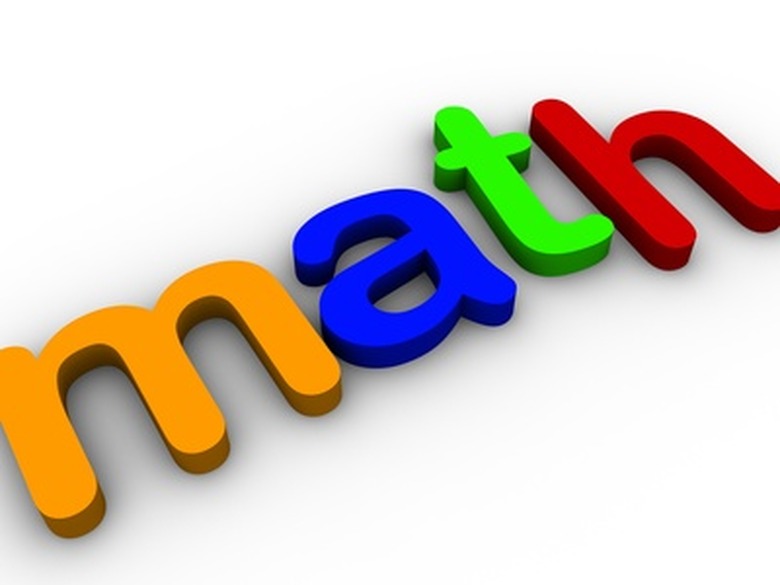What Is A Mathematical Lucky Number?
Math and luck collide frequently but not within palpable everyday meaning. In mathematics, however, whimsical as it may seem, there are numerous ways to derive a lucky number. The latest method to determine what is called a lucky number is a list of positive integers derived through the process of sieving. Think of sifting numbers, much as you would sift lumps from flour except using a mathematical formula. In the 1950s a group of mathematicians at the Los Alamos National Laboratories in California devised a sieving method to derive what they called lucky numbers.
The Sieving Process
The Sieving Process
Start with a list of positive numbers in sequence (1, 2, 3, 4 and so on). It doesn't matter the size of the sequence for the sieve to determine lucky numbers, but to make it manageable, pick the numbers 1 to 100. This is done in steps. Put a box around 1. Now remove every second number from the list 2,4,6,8 ...100) That leaves you with the first remaining number of 3. Now, box 3 and remove every third number among those remaining. That removes 7, 9, 13, 15, 19.... Now, starting with 7, box it, and repeat the process and you're left with 9, 13, 15, 21.... Box 9 and continue this process until you've exhausted all numbers that can be eliminated up to 100. For the record, here are the so-called lucky boxed numbers up to 100: 2, 3, 7, 9, 13, 15, 21, 25, 31, 33, 37, 43, 49, 51, 63, 67, 69, 73, 75, 79, 87, 93 and 99.
What Makes Them Lucky
What Makes Them Lucky
They are "lucky" because they survived the sifting process (no matter how fanciful that may seem). They also share some of the same distributive properties as prime numbers, which is odd because prime numbers rely on their multiplicative relationship while the lucky numbers are a matter of simply counting. Also, the distances between successive luckies keep increasing as the numbers increase. In addition, the number of twin primes–primes that differ by 2–is close to the number of twin luckies. There are several theorems about why this would hold, but other than calling them "lucky," it doesn't seem to make them luckier than the non-surviving numbers. Note that 13 is one of the lucky numbers and so is 7.
Not Luck as We Know It
Not Luck as We Know It
Similar mathematical sieving formulas have been employed in the past, but none has given rise to anything that is conventionally considered lucky. Luck, in the popular sense, is producing something good by chance or bringing about a favorable result, whether it's playing roulette or craps. In math, it means something entirely different.
Similar Sieving Methodology
Similar Sieving Methodology
The sieve of Eratosthenes (276-194 B.C.) is very similar to the sieve process of Los Alamos except the numbers are sifted slightly differently. Again, limit the primes to under 100 and cross off one first (not considered a prime, despite what many of us were taught) and again proceed in steps. On every step, mark the first number not yet crossed off as a prime, then cross out all of its multiples. Repeat the step until the smallest number left does not exceed the square root of 100 (in this case 97). The primes sieved in this fashion are 2,3,5,7,11,13,17,19,23,29,31,37,41,43,47,53,59,61,67,71,73,79,83,89 (and 97). Note, 7 and 13 are prime, too. Lucky, huh?
Math and Luck
Math and Luck
Clearly, what mathematicians refer to as lucky numbers have no correlation with what non-mathematicians consider to be luck, which has more to do with probability and chance and maybe even numerology than the methodology espoused by the mathematicians at Los Alamos or in ancient times. There is at least one instance where the two overlap: when throwing die. There are 36 possible number combinations with throwing two die. The odds are 6 in 36 that you will throw two die adding up to 7–the number with the highest number of combinations (probability) at 5-to-1 odds. Hence the term, lucky 7.
References
Cite This Article
MLA
Ayers, Chuck. "What Is A Mathematical Lucky Number?" sciencing.com, https://www.sciencing.com/mathematical-lucky-number-7522932/. 24 April 2017.
APA
Ayers, Chuck. (2017, April 24). What Is A Mathematical Lucky Number?. sciencing.com. Retrieved from https://www.sciencing.com/mathematical-lucky-number-7522932/
Chicago
Ayers, Chuck. What Is A Mathematical Lucky Number? last modified August 30, 2022. https://www.sciencing.com/mathematical-lucky-number-7522932/
